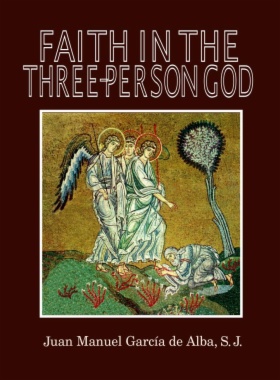"It is truly a pleasure for me to present this book of theology, “FAITH IN THE THREE-PERSON GOD,” written by Father Juan Manuel García de Alba, S.J. This is a book about the fundamental mysteries of our faith as expressed in the Creed. The author makes an effort to present the compendium of our faith in a clear and simple manner. His treatise, while not absolutely original, is unusual. It takes as its starting point the faith in which we were baptized and that we already possess, by the grace of God. He undertakes a wide-ranging Biblical analysis and works up to the high point that was reached in the Trinitarian and Christological councils in the first centuries of the Christian era. He highlights the profound relationship between each human person and God in Three Persons, but especially the Catholic Christian’s relationship with God the Father of Jesus and our Father; with Jesus Christ the Lord of all times, places and persons; and with the Holy Spirit, the gift bestowed on each member of the Body of Christ that is the Church."
- Cover
- Title page
- Copyright page
- Presentation
- Table of content
- Introduction
- Foreword
- Chapter I. God manifests himself
- 1.1 The idea of God
- 1.2 God and culture
- 1.3 God and life
- 1.4 The Living God
- Chapter II. God communicates
- 2.1 Personal God
- 2.2 God and the History of Salvation
- Chapter III. How to talk about god?
- 3.1 Personal God
- 3.2 Analogy
- 3.3 Time and eternity
- 3.4 Unfathomable and Incomprehensible
- Chapter IV. Our knowledge of god
- 4.1 God in the Old Testament
- 4.2 God is the Creator
- 4.3 God’s fatherhood in the Old Testament
- 4.4 God is all-powerful
- 4.5 God is one and singular
- 4.6 The God of Jesus
- 4.7 Faith and following
- 4.8 Faith in Jesus after the resurrection
- Chapter V. Jesus’ father and our father
- 5.1 God in the Old Testament
- 5.2 Father of Jesus
- 5.3 What it means that God is our Father
- 5.4 God begets his beloved Son
- 5.5 What do we mean by divine adoption?
- 5.6 Principle of incorporation
- 5.7 For us, and for our salvation, he came
down from heaven
- 5.8 He came down from heaven
- Chapter VI. Jesus is the son of god
- 6.1 Meaning of the expression
- 6.2 What it means for us that Jesus is the Son
of God
- 6.3 Jesus is God along with the Father and the
Holy Spirit
- 6.4 What does Jesus’ divinity mean for us?
- 6.5 Pre-existence
- 6.6 The incarnation
- 6.7 Jesus the Creator
- 6.8 Difference between Jesus in time and Jesus
in eternity
- 6.9 The Jesus of faith and of historical reality
- 6.10 Representation of time and eternity
- Chapter VII. Jesus and the holy spirit
- 7.1 The Holy Spirit in the Synoptics
- 7.2 The Holy Spirit in Paul and John
- 7.3 The Spirit and the Early Church
- 7.4 The Holy Spirit as a personal gift
- 7.5 The Holy Spirit and today’s Church
- 7.6 Jesus “has come to judge the living and the
dead”
- Chapter VIII. Trinitarian faith
- 8.1 Origin of Trinitarian faith
- 8.2 The Trinitarian question
- 8.3 Person and hypostasis
- 8.4 Digression on the human person
- 8.5 Trinitarian faith and the fullness of Christian life
- 8.6 Divine unity and Christian life
- Chapter IX. The holy spirit and the final articles of the creed
- 9.1 The one, holy, catholic and apostolic Church
- 9.2 I believe in one Church
- 9.3 The holy Church
- 9.4 The Church is catholic
- 9.5 The Church is apostolic
- 9.6 The communion of saints
- 9.7 The forgiveness of sins
- 9.8 Personal resurrection
- 9.9 Life in communion with God –immortality,
or eternal life–
- Chapter X. Trinitarian and christological councils
- 10.1 Descriptive Trinitarian images prior to Nicaea
- 10.2 Council of Nicaea, 325 A.D.
- 10.3 Trinitarian theology in the East and West
- 10.4 First Council of Constantinople, 381 A.D.
Dz-H 150
- 10.5 Constantinople II, 553 A.D., the 5th Ecumenical
Council Dz-H 421-438.
- Chapter XI. Doctrine on the trinity
- 11.1 The Catechism of the Catholic Church
- 11.2 Ancient and modern Trinitarian errors
- 11.3 Syntactical norms for Trinitarian expressions
- 11.4 Trinitarian concepts
- 11.5 By way of epilogue
- BiBliography

